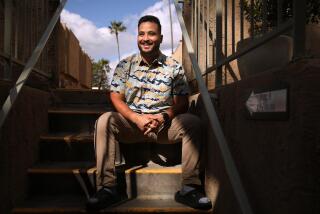‘Virtual Casinos’ Cash In on Lax Rules in Antigua
- Share via
ST. JOHN'S, Antigua and Barbuda — None of the 64,000 residents of this small, three-island Caribbean nation have complained about the latest international gambling boom to sweep their secretive little piece of paradise.
In the past few months, more than a dozen casinos have opened here--though most Antiguans haven’t seen them and don’t know they exist.
Packed with games of roulette, blackjack, poker and craps, each gambling house is small enough to fit into the corner of a tiny room. Yet their owners say they are taking in millions of dollars a month from thousands of bettors, from Los Angeles to New York and beyond.
It’s Internet gambling--a wave of hot new Web sites set up as “virtual casinos” that allow you to win or lose real money from the comfort of your own home. And most of these sites originate in small villas or obscure offices on 108-square-mile Antigua, which is as famous for its secrecy and scandals as it is for its freewheeling tax laws and banking policies.
There are no taxes on capital gains or income in Antigua and Barbuda. The government shuns outside scrutiny, even from its own citizens. During the past decade, it has licensed at least 57 offshore banks and at least two major sports betting operations, and only it knows the names and assets of their owners.
And under legislation passed earlier this year, Antigua has been charging just $100,000 a year for an Internet casino license that offers a similar promise of minimum regulation, maximum anonymity and tax-free profit.
But all that may soon change.
The “Interbet” boom comes amid a series of recent corruption and fraud scandals here, the biggest involving the collapse of the world’s first Internet bank. From a base in Antigua and with the promise of “utmost privacy,” two Russians allegedly used the Web to bilk wealthy customers in the United States and elsewhere out of tens of millions of dollars before closing the bank and fleeing last month.
The virtual casino boom also comes at a time when off-island critics, among them U.S. law enforcement agencies and the State Department, say Antigua’s loose regulatory track record and its secrecy laws have amounted to a recipe for disaster. Together, they offer organized crime rings and international drug cartels a haven to “wash” billions in illicit profits through Antiguan offshore businesses.
“Antigua’s offshore banking sector--established in the mid-1980s with only limited regulation--expanded rapidly in recent years. . . . Unfortunately, inadequate regulation and vetting led to a surge in questionable banking operations--a number with alleged links to Russian criminal elements,” declared the State Department’s most recent report on the international narcotics and money-laundering trades, issued in March.
“The growing potential for money laundering has been an increasing concern of both the U.S. and Antiguan governments,” the report added.
The advent of Internet casino gambling here merely ups the ante for international agencies attempting to prevent global money laundering and computer fraud in an era when criminal technology is fast eclipsing the tools of law enforcement.
The State Department specifically cited Antigua’s Internet banking and casino industries--”all with a similar lack of effective regulation”--as cause for concern.
The U.S. report carefully praised Antiguan Prime Minister Lester Bird for tough new laws against money laundering passed in December and for his personal vow to crack down on the island’s booming drug-transshipment trade. His government also is introducing tougher regulation of all offshore operations, the State Department noted.
The few owners of virtual casinos in Antigua who agreed to be interviewed by The Times asserted that they welcome the new regulations, insisting that their operations are not only legal and honest but also state of the art.
American Bill Scott, who moved his offshore sports betting operation to Antigua from the nearby island of St. Martin two years ago, said his Intercasino Web site was a natural next step for his parent company, World Wide Tele Sports.
Located in the heart of St. John’s, the nation’s capital--atop a modern five-story, glass-and-marble building that most Antiguans think houses a computer school--Scott’s operation handles millions of dollars in U.S. sports bets via 800 numbers under a separate Antiguan gaming license, he says.
Scott says he was drawn to Antigua by the efficient phone system and, of course, the fact that gambling is legal here in a tax haven where confidentiality reigns and where even the Internet casinos are not viewed askance.
Surrounded by dozens of computer stations where young Antiguans in headsets were taking sports bets on every conceivable contest one recent Sunday afternoon, Scott said business in his new Internet casino--located in a tiny corner of an adjacent office--is so good that he plans to open two more this week.
“It’s like Vegas. If you lose in one casino, you can go down the street to another,” he said.
To play at an Internet casino, gamblers access a casino site on the World Wide Web through their personal computers, establish an account with a credit card or money order and collect their virtual “chips.” The computer program ushers them into a full-color, multidimensional casino that looks remarkably similar to those in Las Vegas, and they can gamble at the table of their choice.
Given that it is an industry where only the customers’ credit cards and money orders are real--risked against software and humans they never see--Scott acknowledged that Antigua’s latest cyber-craze is ripe for fraud. But he said his casino uses the latest technology from two Canadian computer scientists, along with the older technology of random number generator chips, to ensure the fairest game around.
Developed by the directors of Toronto-based Crytologic, which is publicly traded in Canada, Scott’s casino software uses banking and encryption technology to, as he puts it, “convert real money into virtual cash” quickly and safely. And all winners, he said, are paid in a day.
Although Scott said he welcomed the “big package of new regulations” that the Antiguan government recently sent him as key to protecting the image of the new industry, he added, “I don’t think anybody has the knowledge of how to regulate this technology.”
And that, U.S. officials say, is especially true in Antigua, where the cash-strapped government has few resources and, critics say, little resolve to become more open.
“This island is operated like a lodge. It’s like a secret society,” said Winston Derrick, who publishes Antigua’s only independent newspaper. “You have to fight and fight for information.”
The government’s annual expenditures, for example, are published, but years after the money is spent--a deliberate effort to minimize public interest and scrutiny, Derrick said. He added that police officials say even the most basic crime report is confidential.
Although the government permits Derrick to publish his feisty Daily Observer, he and his brother were arrested when they started the island’s first independent radio station last December. The case is still in court, and the station has not reopened.
The prospect of prison also looms for Leonard Tim Hector if the opposition leader and publisher writes another word about the island’s latest scandal--this one involving the prime minister and his family--in Hector’s biweekly, the Outlet.
Bird, whose family has controlled Antigua’s power and politics for half a century, won an injunction against Hector after the opposition leader published stories attacking the premier for alleged corruption. One quoted a Venezuelan businessman, who was convicted of cocaine trafficking along with one of Bird’s brothers two years ago, as saying that the premier took a $1-million bribe from Colombia’s Cali cartel to permit drug transshipments through Antigua--a charge Bird flatly denies.
Hector said he is undecided about whether to risk what would be his 12th prison term here by publishing more of the Venezuelan’s accusations. But the injunction has not stopped him from sharply criticizing Bird’s government for its policies toward offshore business and its lax regulation. He blamed those factors for the recent Internet bank debacle and said they invite similar abuse in the virtual casino industry.
“They simply do not intend to regulate these new Internet casinos,” Hector said in a recent interview. “The prime minister doesn’t see that in his best interest.”
None of the few government officials who oversee the new cyber-casino trade along with all other offshore businesses on the island could be reached for comment.
In the aftermath of the Internet bank collapse, however, the official Antigua & Barbuda Government Internet Web page has posted the new offshore rules and regulations for closer inspection.
But a look at the rise and fall of the European Union Bank, which billed itself as the world’s first full-service Internet bank, helps explain why U.S. officials are viewing Antigua’s latest cyber-boom with concern.
Privately, many of those officials said the Antiguan government should have been suspicious of the bank’s operations long before it closed its only door in early August, leaving tens of millions of dollars in deposits missing.
The Bank of England grew suspicious of the bank in October. It publicly warned investors that the bank was offering unrealistically high interest rates in an unsecured environment that is not policed.
After a similar alert from U.S. banking officials in April, the state of Idaho issued a cease-and-desist order against the bank, barring it from offering its services to Internet customers in the state.
But it wasn’t until the day the bank shut down that Antigua’s new Office of National Drugs and Money Laundering Policy issued an official “fraud alert,” which opposition publisher Hector called “closing the stable door after both thieves and horses have bolted.”
Jane Rodriguez, Bill Scott’s systems administrator--who set up the Intercasino Web site--concluded: “If the government wants the revenue to continue to flow, they know they have got to make an effort to control it.”
More to Read
Sign up for Essential California
The most important California stories and recommendations in your inbox every morning.
You may occasionally receive promotional content from the Los Angeles Times.












